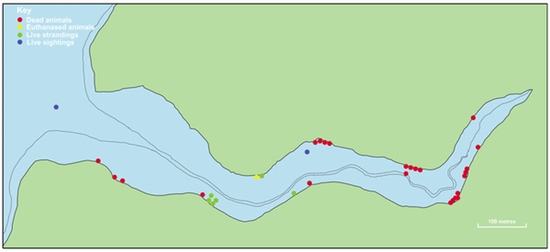2008 UK stranding linked to Navy exercises
Effects of Noise on Wildlife, Ocean, Science, Sonar Add commentsOn June 9, 2008, 26 common dolphins, 21 of them infants, stranded and died in river estuaries around Falmouth Bay, as several days of Naval exercises involving over 30 ships wound down (see AIEnews coverage at the time). A four-year study (read it online) has concluded that unspecified Naval activities are “the most probable (but not definitive) cause” of the strandings, which involved at least 60 animals in all, with most of the adults re-floated and guided back to sea.
The study ruled out other common causes of cetacean strandings, including foraging for fish in shallows, attack by orcas, illness, algal toxins, recreational boats, and earthquakes. However, the researchers also could not identify a likely trigger among the Naval activities taking place on the morning of the strandings or the day preceding the discovery of the struggling animals. Press reports at the time suggested that locals heard some large explosions on the day before and day of the strandings, though the researchers did not find records to indicate such activity. Mid-frequency sonar transmissions ended four days earlier; that or other ongoing activity is thought to have driven the dolphins into the bay, with unknown further disruptions triggering the fatal strandings early on the 9th. According to lead author Paul Jepson, “Eyewitnesses described their behaviour as swimming continuously in tight circles, being vocal, fluke-slapping, leaning sideways, and often with one or more individuals attempting to strand.”

The lack of a clear cause for the final stranding event during a relative pause in Naval activity on the day before the early-morning discovery of the floundering dolphins adds a familiar ambiguity to the situation. A Naval spokesman noted that they disagreed with the report’s conclusion and stressed their decades of similar exercises in the area without mass strandings, while conservation groups including the NRDC and the UK-based Whale and Dolphin Conservation called for exercises to be redesigned. While cetaceans can often move away from unwanted noise, it’s long been known that strandings can occur when animals become trapped in areas with no escape route, such as apparently happened here.
Despite Naval denials of responsibility, this event did spur some changes that have led to later exercises being temporarily suspended when dolphins appeared on the verge of being trapped in a similar situation. As detailed in the new study:
Following this MSE (Mass Stranding Event) and recommendations from the organisations involved in the rescue of dolphins in the MSE, the UK Ministry of Defence initiated the Marine Underwater Sound Stakeholders Forum in the UK to regularly meet with all interested stakeholders (scientists, other Government Departments like Defra and a range of non-Governmental organisations) to discuss these issues in some detail. A direct line of communication was also established after the Falmouth MSE to facilitate rapid exchange of information between cetacean strandings/sightings organisations and Royal Navy Naval Command Headquarters to report groups of pelagic cetaceans seen unusually close to shore and potentially at increased risk of stranding. This was used to report a near-MSE of over 20 common dolphins in the Fal estuary in April 2009 that was seen 15 minutes after RN sonar trials were initiated in the region. The RN immediately modified the naval exercise (including use of active sonars) until the group of dolphins had returned to open sea several hours later. The need to alter training excercises due to the presence of dolphins has not subsequently occurred in this region.
According to the authors, “Such continual improvement of mitigation strategies by the military themselves is probably the best way to limit future environmental impacts of naval activities, including cetacean MSEs.”
